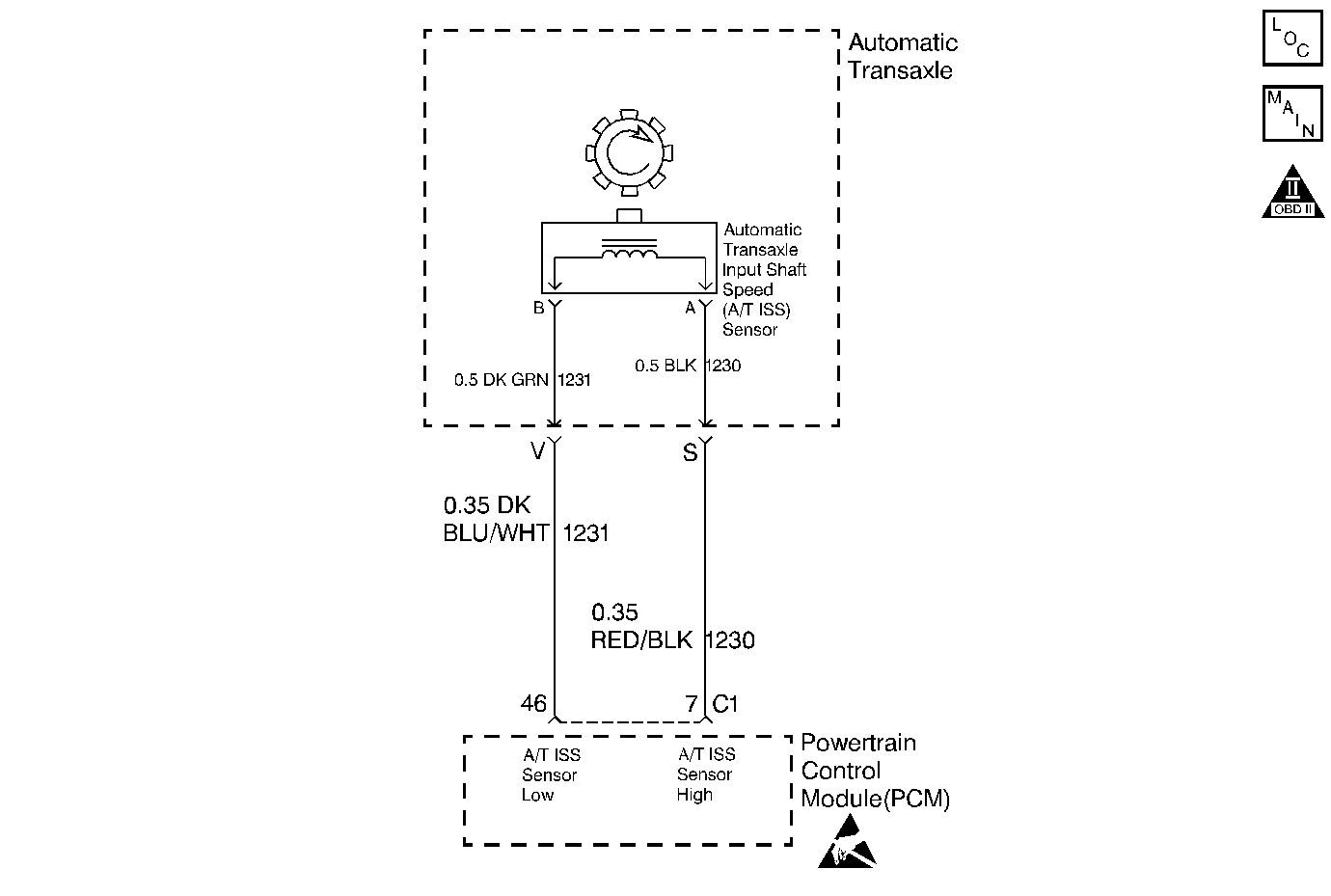
Circuit Description
The Automatic Transmission Input Speed Sensor (A/T ISS) is a permanent magnet with a coil of wire wound around it. The A/T ISS mounts in the transmission case facing the drive sprocket of the input shaft. An air gap of 0.08-2.12 mm (0.0032-0.834 in) between the sensor and drive sprocket must be maintained in order to transmit an accurate AC voltage. Sensor voltage varies from 0.5 volts AC at 100 RPM to more than 100 volts at 6000 RPM. This diagnostic monitors the A/T ISS circuit. The circuit may be functional but not in the normal operating range. This diagnostic indicates stuck, erratic, or intermittent values, indicating poor performance of the system. The A/T ISS has a resistance value of 893-1428 ohms.
If the PCM detects an unrealistically large change in data from the A/T Input (Shaft) Speed Sensor, then DTC P0716 sets. DTC P0716 is a Type B DTC.
Conditions for Setting the DTC
| • | No TP DTCs P0121, P0122 or P0123 are set. |
| • | No VSS DTCs P0502 or P0503 are set. |
| • | No A/T ISS DTC P0717 is set. |
| • | No 1-2 shift solenoid valve electrical DTC P0753 is set. |
| • | No 2-3 shift solenoid valve electrical DTC P0758 is set. |
| • | No 1-2 shift solenoid valve performance DTC P0751 is set. |
| • | No 2-3 shift solenoid valve performance DTC P0756 is set. |
| • | The vehicle speed is greater than 8 km/h (5 mph). |
| • | The throttle angle is greater than 14%. |
| • | The engine running for more than 5 seconds. |
| • | Not in fuel shut off |
| • | The input speed changes by 1300 RPM or greater in 0.8 seconds. |
Action Taken When the DTC Sets
| • | The PCM illuminates the Malfunction Indicator Lamp (MIL) after 2 consecutive ignition cycles with a failure reported. |
| • | The PCM disables shift adapts. |
Conditions for Clearing the MIL/DTC
| • | The PCM turns OFF the MIL after three consecutive ignition cycles without a failure reported. |
| • | A scan tool can clear the DTC from the PCM history. The PCM clears the DTC from the PCM history if the vehicle completes 40 warm-up cycles without a failure reported. |
| • | The PCM cancels the DTC default actions when the fault no longer exists and the ignition is OFF long enough in order to power down the PCM. |
Diagnostic Aids
| • | Ensure the engine wiring harness is not located near spark plug wires or DIS coils. |
| • | Inspect the wiring for poor electrical connections at the PCM. Inspect the wiring for poor electrical connections at the transmission 20-way connector. Inspect the wiring for poor electrical connections at the A/T ISS 2-way connector. Look for the following problems: |
| - | A bent terminal |
| - | A backed out terminal |
| - | A damaged terminal |
| - | Poor terminal tension |
| - | A chafed wire |
| • | When diagnosing for an intermittent short or open, massage the wiring harness while watching the test equipment for a change. |
Test Description
The numbers below refer to the step numbers on the diagnostic chart.
-
Step 2 verifies that the PCM receives a signal from the Automatic Transmission Input Speed Sensor (A/T ISS).
-
Important: Florescent lighting may interfere with this test.
Use the J 35616-A Connector Test Adapter Kit, so as not to damage the terminals. Step 3 verifies that there are no opens in the circuitry from the A/T ISS to the PCM.
-
Important: Florescent lighting may interfere with this test.
Use the J 35616-A Connector Test Adapter Kit, so as not to damage the terminals. Step 4 verifies that there are no opens in the circuitry from the A/T ISS to the transmission 20-way connector.
-
Step 6 performs a resistance check on the A/T ISS and the A/T wiring harness.
Step | Action | Value(s) | Yes | No | ||||||
|---|---|---|---|---|---|---|---|---|---|---|
1 | Was the Powertrain On-Board Diagnostic (OBD) System Check performed? | -- | ||||||||
Important: Before clearing the DTCs, use the scan tool in order to record the Freeze Frame and Failure Records for reference. The Clear Info function will erase the data. Does the scan tool display a transmission input speed greater than the specified value? | 100 RPM | Go to Diagnostic Aids | ||||||||
Does the voltmeter display an AC voltage greater than the specified value? | 0.1 volts | |||||||||
Does the voltmeter display an AC voltage greater than the specified value? | 0.5 volts | |||||||||
5 |
Refer to Troubleshooting Procedures, Section 8. Did you find and correct the problem? | -- | -- | |||||||
| 1127ohms at 20°C (68°F) 1428ohms at 88°C (190°F) | |||||||||
7 |
Refer to Troubleshooting Procedures, Section 8. Did you find a problem? | -- | ||||||||
8 | Is the resistance less than the specified value? | 893ohms at 20°C (68°F) volts 1132ohms at 88°C (190°F) | ||||||||
9 |
Refer to Troubleshooting Procedures, Section 8. Did you find a problem? | -- | ||||||||
10 | Replace the A/T Wiring Harness. Refer to Solenoids and Wiring Harness, in On-Vehicle Service. Is the replacement complete? | -- | -- | |||||||
11 | Replace the A/T ISS. Refer to Solenoids and Wiring Harness, in On-Vehicle Service. Is the replacement complete? | -- | -- | |||||||
12 | Replace the PCM. Refer to Powertrain Control Module Replacement/Programming , Section 6. Is the replacement complete? | -- | -- | |||||||
13 | In order to verify your repair, perform the following procedure:
Has the test run and passed? | -- | System OK |
